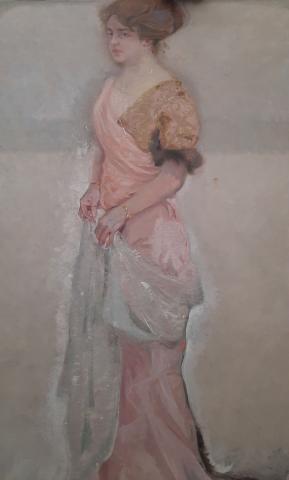Rosa Hirsch, who came from a family of factory owners in Pilsen, married the chemist and industrialist Alfred Kraus in 1900. From 1908, the couple lived with their two children Marianne and Richard in an apartment furnished by Adolf Loos at Mohsgasse 2 in Vienna’s 3rd district. As a friend of Alfred's brother Karl Kraus, Loos received several commissions from members of the Kraus and Hirsch families. The couple also had both friendly and professional ties with Malvine and Oskar Reichel – Alfred Kraus was involved in the company Kunst und Wohnung R. Lorenz GesmbH, whose business was temporarily run by Oskar Reichel and his son Raimund.
Rosa Kraus, who had already left the Jewish Community in 1907, was – like her family – persecuted as Jewish after the "Anschluss" of Austria to the National Socialist German Reich in March 1938. Alfred Kraus died in August 1938 at the Kurhaus Sacher in Baden near Vienna. Marianne, married Winterberg, left for Prague just a few days after her father's death. Rosa and her son Richard Kraus, an authorized signatory in the family business Vereinigte Papier und Ultramarinfabriken AG founded by his grandfather, fled to Belgium in February 1939. They entered the country with the help of a business visa, which would subsequently cause them difficulties in obtaining a residence permit, which Rosa Kraus finally received in November 1940. Richard Kraus was arrested on 10 May 1940, the day of the German invasion of Belgium, as one of an estimated 6,000 to 8,000 foreign men whom the Belgian government considered to be potential allies of the Germans. Like many other refugees from National Socialism, Richard Kraus was taken to the Camp de Gurs and from there to the Les Milles camp in the Bouches-du-Rhône department, where he was interned in the 8th group of foreign workers until his transfer to Aubagne to work with the Groupements de travailleurs étrangers (GTE) in January 1942. He died as a result of severe mistreatment by the guards in February 1942.
Rosa Kraus married the Belgian citizen Adolphe Louis Hoton in August 1942 and lived in Saint-Gilles-lez-Bruxelles until her death in 1951. Her daughter Marianne had fled from Prague to England with her son in April 1939. After divorcing her first husband, she married Albert Bauer, a doctor from Vienna, in 1946. She died in London in 1947. Her removal goods, five furniture van meters consisting of 18 colli, were liquidated by Vugesta in 1943, most of them sold at the Dorotheum. After the end of the war, Rosa Kraus and her family were given back a property at Reisnerstraße 28 in Vienna’s 3rd district, as well as shares in a property at Am Modenapark 4 that had been expropriated. The Kraus family's apartment interior furnishings – in addition to handicraft objects and a painting by Jacopo Bassano and probably several works by Max Oppenheimer (MOPP), including a portrait of Rosa Kraus that her husband had commissioned from the artist in 1909 – were lost in direct connection with persecution and flight. In 1988, the portrait was donated to the mumok Museum moderner Kunst Stiftung Ludwig Wien. In 2015, the Art Restitution Advisory Board recommended the restitution of the Rosa Kraus portrait to the legal successors of Alfred and Rosa Kraus. It was handed over on 30 April 2024.

